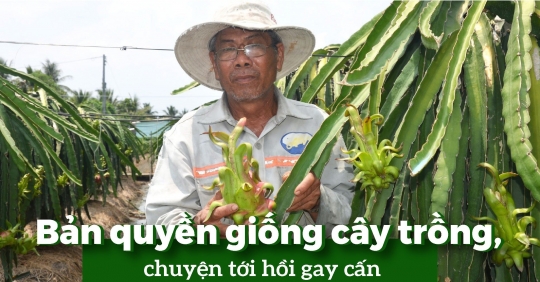Seen from Tu Quy Purple Milkweed trademark conflict
In 2022, Mr. Tran Anh Nhan, Director of My Phuoc High-Tech Agricultural Cooperative and Community Tourism (hereinafter referred to as My Phuoc Cooperative) in Ke Sach District, Soc Trang Province, submitted an application to the Crop Production Department (Ministry of Agriculture and rural development). Rural Development) with the content that his family discovered in 2014 that purple breast milk has good tolerance to drought and salinity, gives fruit all year round, fruit has thin skin, little latex when eaten … and became a milk garden remodeled with an area of 3.5 ha.
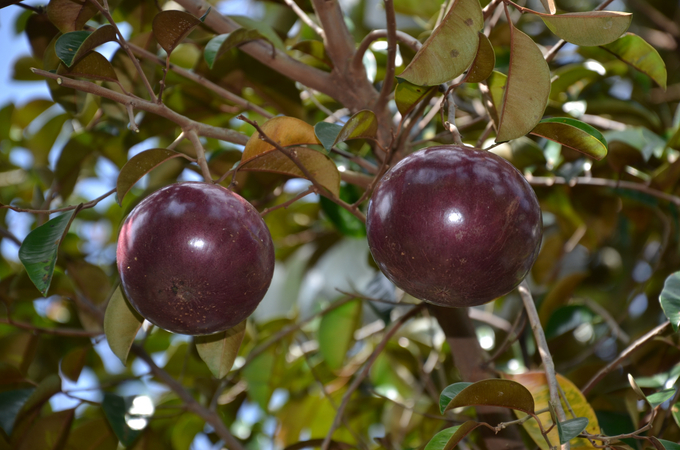
Like Tu Quy breast milk. Picture: Minh Dam.
Accordingly, the cooperative has submitted an application to the Plant Variety Protection Office (Cultivation Department) to register this purple breast milk variety named Tu Quy purple breast milk for protection from July 2021. At the same time, the cooperative has signed a test contract with the National Center for Testing and Testing of Seeds and Plant Products and is awaiting the test results to complete the plant variety protection documents. Thereafter, the cooperative also registered the Tu Quy Purple Breast trademark with the National Office of Intellectual Property and is in the approval process.
Unexpectedly, on June 20, 2022, Ben Tre Ministry of Agriculture and Rural Development issued Decision No. 406/QD-SNN recognizing Tu Quy BTR Leading Orchard (Certificate of Recognition No. 248/GCN-SNN dated June 20, 2022) . June 20, 2022) on another topic. According to the information in the Certificate of Recognition, the name of the above species is the same name as that of the My Phuoc Cooperative (Ke Sach District, Soc Trang Province) being registered for protection.
Therefore, the My Phuoc Cooperative asked the Ministry of Crop Production to review the decision of the Ben Tre Ministry of Agriculture and Rural Development, as it considered that it had violated its right to registration to protect new plant varieties.
Accordingly, the Ministry of Crop Production held a meeting between the parties, including the Ministry of Agriculture and Rural Development of Soc Trang, the Subdepartment of Plantations and Plant Protection of Soc Trang Province, the Department of Plantations and Plant Protection of Ben Tre Province, and representatives of the two contending units. After sitting together in a spirit of harmony without detracting from the brand of agricultural products, the parties have found a common voice.
On February 13, 2023, Ben Tre’s Department of Agriculture and Rural Development sent an official letter to the Department of Crop Production to request a certificate of recognition of the name of the new variety Four Seasons Purple Breast (changed from the previous Purple Breast Tua) Tue Quarter BTR).
Many views on copyrights like dragon fruit LD1
Regarding the copyright dispute over the purple breast milk variety Tu Quy, the Ministry of Cultivation recently had to deal with the copyright issue of the LD1 red flesh dragon fruit variety that Hoang Phat Fruit Co., Ltd. heard. Original upon receipt of copyright transfer from Southern Fruit Institute.
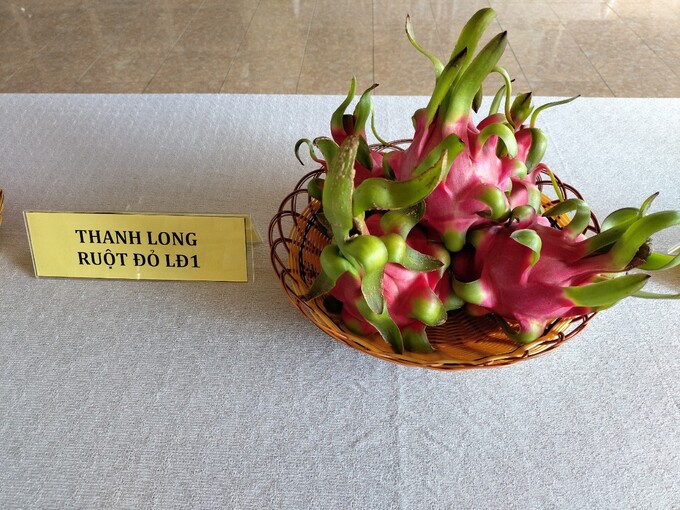
The red-fleshed dragon fruit variety was bred by the Southern Fruit Institute. Picture: Minh Dam.
In particular, some companies that bought LD1 red-flesh dragonfruit products fell behind when Japan and Korea did not allow some companies’ export of dragonfruit to that market. Importers must have a growing primary choice of red-flesh dragonfruit. Meanwhile, the copyright of the red flesh dragon fruit variety has been sold to Hoang Phat Fruit Co., Ltd. by the Southern Fruit Institute and breeding team for VND5 billion. transfer.
The irony is that, according to some dragon fruit growers, some dragon fruit growers themselves bought LD1 red-fleshed dragon fruit seedlings from the Southern Fruit Tree Institute dozens of years ago, when the Southern Fruit Institute had not yet sold any specimens. The right to this dragon fruit to grow Hang Phat Fruit Co.,Ltd. So farmers have been wondering why their dragon fruit trees aren’t copyrighted until now?
Regarding these problems, Dr. Vo Huu Thoai, Director of the Southern Fruit Tree Institute: In order to be recognized as a new agricultural plant variety under the regulations of the Ministry of Agriculture and Rural Development, the red-fleshed dragon fruit variety LD1 must be produced trial production with a minimum area of 50 ha. Therefore, the institute has with worked together with a number of farming households to provide seed for experimental production households. Perhaps in the process of co-planting with the Southern Fruit Institute, farmers misunderstood the supply of seeds for experimental plantings with the sale of commercial varieties, so they propagated LD1 red-flesh dragonfruit themselves. Over the years, the area planted with the LD1 variety has reached tens of thousands of hectares, which is inevitable.
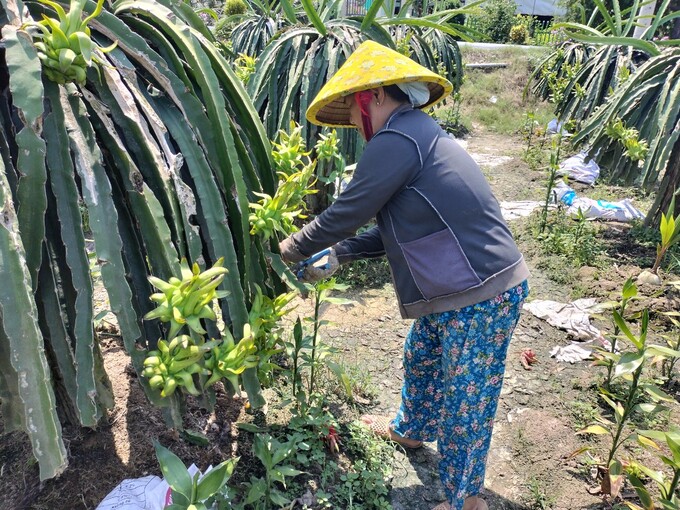
The area planted with red-fleshed dragon fruit has now reached tens of thousands of hectares. Picture: Minh Dam.
This is also a sensitive time, while farmers are used to spontaneous production, there is a situation where new varieties have been leaked before being recognized. In fact, there have been many instances of plant varieties that are under examination, not yet recognized, not copyrighted, not quality assured… planted massively.
To solve the above problem, functional sectors and local authorities need to step in to take stricter control measures when testing new plant varieties.
dr Pham Thi Be Tu, Lecturer at the Department of Genetics and Plant Breeding (University of Agriculture, Can Tho University) said, “The issue of plant variety licensing is now very important to ensure that the benefits and sources of funding are secured for units and organizations and individuals to research and reinvest. At the same time, show the breeder fairness when disputes arise.
However, the current variety testing still has some difficulties, takes a lot of time and money, and the controls during the trial planting process are not strict. For example, to recognize the copyright of a rice variety, it takes at least 4 years in many localities, with a minimum area of 50 hectares.
Regarding the copyright of the LD1 red flesh dragon fruit, according to Dr. Pham Thi Be Tu transferred the copyright of this plant variety to a private company in accordance with the regulations of the Southern Fruit Institute. The current problem is to resolve satisfactorily the “fact” that requires each party to sit down for the common good to negotiate and harmonize so that no single entity or individual is affected, leading to division and the Value chain of agricultural products is disrupted.
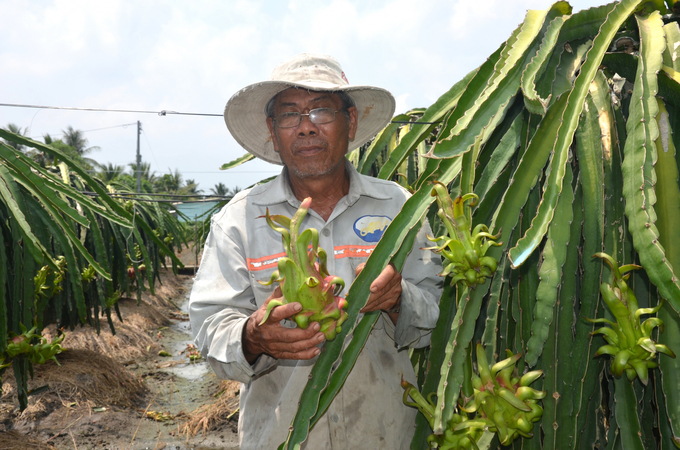
The copyright issue of dragon fruit variety LD1 will not have a major impact on the production and export of dragon fruit in our country, but it needs to be finally resolved in the long term. Picture: Minh Dam.
Currently, more than 90% of Vietnamese dragon fruit production is exported to China. Therefore, the copyright issue of LD1 red flesh dragon fruit variety will not have a big impact on Vietnam’s dragon fruit export activities. But in the long term, dragon fruit (including LD1 red-pulp dragon fruit) exported to Japan, Korea… is a promising direction, so the problems are still entangled with it. Copyright of the LD1 dragon fruit variety needs to be thoroughly researched and the same solved.
As for the long-term solution, a fruit tree expert said that the state agency could explore the negotiation option and consider buying back the copyright of this LD1 dragon fruit variety from Hoang Phat Fruits so that all farmers can benefit collectively. The acquisition of copyrights by the state for “sharing” is also a viable and long-term direction that will help create favorable conditions for farmers to have more favorable access to this variety of dragon fruit to develop production and promote export .
No one may “freely use” the same copyright.
Also regarding the story of the copyright owner of the dragon fruit variety LD1, Mr. Nguyen Thanh Minh, head of Plant Variety Protection Office (Department of Cultivation), said that: The plant variety owner/originator has to spend time, money in the process of selecting, creating and registering to protect new ones plant varieties. This is a very risky and costly process.
Once granted the right (protected), they are required to pay an annual fee to the state to maintain the validity of the protection certificate. Thus, plant variety protection gives the owner the exclusive right to exploit the right or license others to exploit it and collect royalties to offset the above costs.
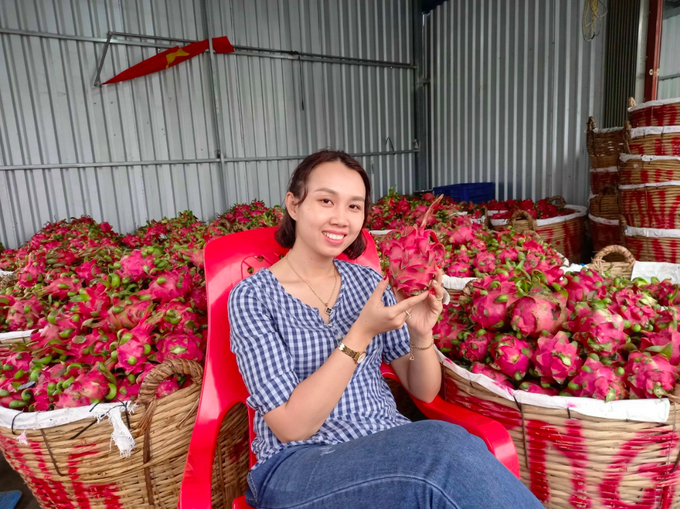
Red-fleshed dragon fruit is one of the export fruit products with ample space. Picture: Minh Dam.
Imagine, before the LD1 dragon fruit variety, how many dragon fruit varieties were created without being accepted by production, in which case the research and breeding costs are considered lost. On the contrary, in the next case that there is a dragon fruit variety other than LD1, the grower will replace the LD1 variety. At this time, it is difficult for the rights holder to recover the money spent on the purchase of the LD1 variety.
There is also an opinion that it should be given to the Southern Fruit Tree Institute for farmers to plant. Our legal framework for plant variety protection considers plant varieties created by public organizations to be state-owned but transferred to public organizations on behalf of the state to exploit the rights. We also have detailed regulations on the percentage of royalties collected that go to author, common life fund, development fund withholding, etc.
Thus it can be understood that there is no such thing as a “free use” of rights, whether public or private. No one has said in advance whether, if Southern Fruit Institute still owns it, the royalties it collects will be higher or lower than the figure provided by Hoang Phat Fruit at the February 16, 2023 meeting, as the Department of the Crop production chaired.
“The amount of royalties is an agreement between the buyer and the seller. However, the current law also provides that in certain cases the state can intervene if necessary to compel the holder of the right to transfer the right to one or more other persons to exploit the right, but the transfer of the right to use the Plant variety under a compulsory decision is subject to certain conditions and is not free,” said Mr. Nguyen Thanh Minh.

